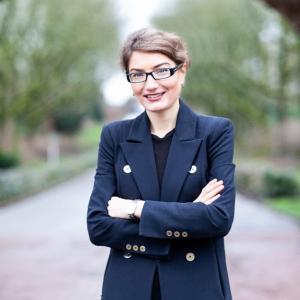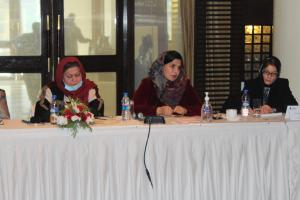Discussion
Details
On November 28, 2020, KAS Kabul Office in partnership with EPD organized a dialogue between women, Islamic scholars, imams and mullahs from various provinces. The role of women in the peace process and statebuilding process, the understandings of women's and human rights and the visions of the young Afghan generation were discussed.
In two panels, participants discussed various Islamic interpretations of Islamic law (Shari'a) with regard to women's rights and equality of women in the family, education, and workplace.
About 25 Afghan women and 25 Islamic scholars (ulama, mullahs, imams) from different provinces of Afghanistan participated in this confidence-building dialogue in Kabul. Diplomatic representatives from embassies of various European and Muslim countries (EU, Germany, Norway, Sweden, UK, Netherlands, OIC, Indonesia) were invited as observers.
For the Afghan religious scholars and mullahs from the provinces, this was the first dialogue and direct exchange with Afghan women as well as with representatives of the international community.
Background of the dialogues with Islamic scholars
There is usually little contact between Afghan women and conservative Islamic scholars. Feelings of mutual distrust, prejudice and perceived conflicts of interest prevail on both sides. Many Afghan women hold the view that their concerns have been abandoned by Islamic scholars and that their basic rights and freedoms have been restricted and violated by strict religious interpretations of Islam. Many Afghan women who want to live a self-determined life with education, a profession and a free choice of spouse fear being dishonored, facing hostile reactions or being blamed to have fallen away from the faith or to have been corrupted by foreign values.
On the other hand, many Afghan Islamic scholars (Ulama, mullahs, imams) feel marginalized in the new political order after 2001. They were not part of the international state-building and stabilization project. The majority therefore either turned their backs on the political elites in Kabul or simply never could establish access to international funding or cooperation.
Many issues that affect the everyday lives and basic rights of Afghan women (education, employment, freedom from harrassment or in public) are justified by the Afghan society on the basis of religion and Islam. Violations of fundamental rights, however, are sometimes more culturally rooted, but legitimized with reference to Islamic values and rules. More balanced interpretations of Islam have been slow to gain acceptance because of a lack of knowledge, lack of access to alternative interpretations or social pressure.
Dialogue and cooperation between locally rooted religious scholars, tribal elders and women's and human rights activists could be a way forward to peace.
Who are the Women Peace Mediators?
The "Women Peace Mediators" are a group of women mediators founded by KAS and EPD in Kabul in 2020 with the aim to support dialogue and consensus building in the Afghan peace process. A series of dialogues was established between women and religious scholars, mullahs and imams, as well as tribal elders and representatives of political Mujahideen parties to discuss issues relating to human and women's rights and political participation in the Afghan peace process.
Goals of the dialogues
- Build knowledge, understanding and trust among different opinion holders (Islamic scholars, mullahs, imams, tribal elders, Afghan women and civil society).
- Identify areas of consensus and dissent for the upcoming peace negotiations.
- Engage religious scholars and local religious-conservative stakeholders as reform partners for peace.
- Provide a dialogue platform for open and trustful exchange.
- Involve the international community (including Muslim countries) for positive support for peace and reconciliation.
"Women Peace Mediator“-Dialogues since 2020
Herat Peace Dialogue with religious scholars and tribal elders (March 2021)
National Ulama Dialogue in Kabul (November 2020)
Dialogue with Mujahideen representatives (2020/2021)
Weekly discussion series with NATO, Berghof Foundation, embassies, OIC & Afghan NGOs
The dialogues take place under Chatham House rules.







